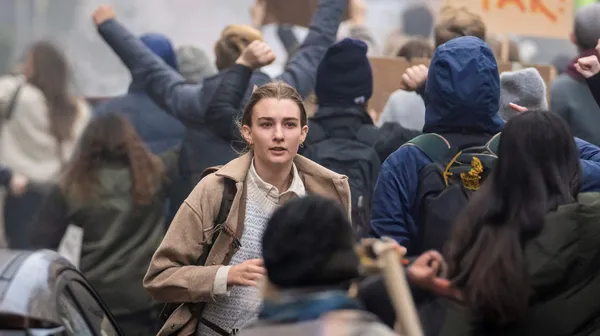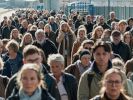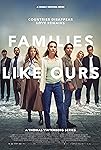Eye For Film >> Movies >> Families Like Ours (2024) Film Review
Families Like Ours
Reviewed by: Jennie Kermode

One of the principal characters in Thomas Vinterberg’s new drama series, which premiered at the Viennale and went on to play at the Toronto International Film Festival, is an architect – an man who has made his living by solving problems and coming up with constructions to address every need. He’s confronted with a problem that no human skill can remedy when it emerges that the Danish government is planning to close down the country. Efforts to keep rising sea levels at bay are proving increasingly ineffective. Rather than pour more money into this, knowing that it will lose in the end, the government has decided to spend the last of its resources on brokering deals with other countries and evacuating its people.
What is the proper way for individuals and families to respond in a situation like this? For an architect, it doesn’t seem so bad – there’s the prospect of a job in Paris with visas for himself and his wife and baby son. His 18-year-old daughter, Laura, can join them if she gets the grades needed to study at the Sorbonne. Her mother, however, has no such perceived value, and is scheduled to be sent to Bucharest. The boy whom Laura is falling in love with has family in Finland, so is expected to go there. Meanwhile, one of the children Laura cares for in her job is offered a place in England because he’s a promising football talent, but his mother, who has only ever had blue collar jobs, may not make the grade. We follow these characters, and a handful of others, as their lives are torn apart by the sort of crisis they could never have imagined happening to them.

The title rather gives away the point here: even if you’re white and middle class, unexpected change could make you a refugee, forcing you to deal with all the misery experienced by refugees from parts of Africa, Asia and the Middle East today. Or most of it, anyway. There is no sexual violence here. There is little actual death. Vinterberg and co-writer Bo Hr. Hansen understand that to show people the refugee experience as it really is would be overwhelming and alienating. It’s important that people can relate to what they see if they are to continue to imagine themselves in that position. He is careful to show and not to tell, to avoid making the series feel preachy. There is the same deft touch here that he applied in Oscar winner Another Round, in which he explored alcoholism in an character-focused way that invited viewers to let down their guard and go along for the ride.
There is also a careful balance here between the big drama of the premise and the personal dramas experienced by the characters, most of whom pay no particular heed to the wider tragedy unfolding. Laura acts as the film’s conscience and has the most dynamic character arc, forced to grow up fast in response to what’s happening. Initially focused on the personal unfairness of it all, she changes as she observes what’s happening around her. Her indecisiveness as she is torn between her boyfriend, the family she has been living as part of and the mother she feels protective of becomes irritating in places, spun out a little too far in service of a sometimes awkwardly paced plot, but for the most part this kind of difficulty, the doom of many an otherwise passable series, is avoided.
Vinterberg has been at pains to avoid the clichés of the disaster movie. It’s not just the merciful absence of singing nuns – we don’t see any water crashing through barriers or people being swept away. Even violent confrontations are handled in a small-scale, intimate way that puts character first. The threat from the water is conveyed in a dream in which it trickles in beneath a door, gradually spreading out across a hallway carpet. This will evoke horror enough for those whose homes have been flooded, and the quiet invasiveness of it adds to the sense of inevitability in a situation where, as people wrestle with life-changing decisions, most things look just the same as they always have. It’s this uncanny sense of disconnection between day to day reality and the scale of the crisis – a more acute version of what everybody who understand the science of climate change is currently going through – that dominates the first few episodes, before characters begin to move beyond Denmark’s borders and have other issues to contend with.
By keeping the story as low key as he realistically can, Vinterberg is able to illustrate that it’s not just the exploitative methods of people smugglers or the aggression of resentful locals that makes life hard for refugees, but also the crushing weight of bureaucracy and the pain of being apart from loved ones who are themselves vulnerable, not knowing if one will ever see them again. Longstanding family tensions are exacerbated and previously manageable mental health problems threaten to become overwhelming. The cast is uniformly excellent, as one would expect of a high end Danish production, so that even the more sensational plot elements are handled with grace. This also makes it possible to engage even if one is not part of the ‘us’ implied by the title, and finds some of the characters obnoxious or irritatingly clueless. They still come across as human and they’re interesting enough to hold one’s attention.
As a tour of refugee experiences, Families Like Ours packs a lot into seven episodes without feeling overstuffed. It has a few weak links but overall delivers well on drama, and of course, like any Vinterberg work, it’s beautifully shot. There are some powerful images, such as that of a desperate group of people, wrapped up warm and weighed down with luggage, shuffling towards a boat – familiar enough on the surface of it, but made strange by the fact that most of them have blond hair. These are strange days, and it’s good to see serious filmmakers engaging with that on this level.
Reviewed on: 07 Sep 2024
















